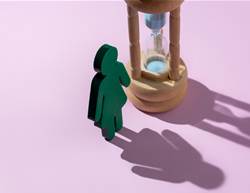Hot flushes easily rank as the most common symptom of menopause, but it can also affect a woman’s libido, sexual satisfaction and overall sexual behaviour.
A new study has identified the factors that affect a woman’s risk of sexual dysfunction and sought to determine the effectiveness of hormone therapy in decreasing that risk.
The study results have published online in Menopause, the journal of The North American Menopause Society (NAMS) and involved more than 200 women aged 45 to 55 years.
Six factors were linked with experiencing greater sexual satisfaction and functioning in the women who took part:
- Positive attitudes about sex
- Positive body image
- Satisfaction with your relationship
- More lifetime sexual partners
- Positive experiences with sex
- Less severe physical menopause symptoms
It found that women with secondary and higher education and a greater number of lifetime sexual partners were less likely to experience sexual dysfunction. In contrast, women with more anxious behaviours during sexual activity and those with more severe menopause symptoms were more at risk for sexual dysfunction.
Hormone therapy was not found to mitigate the risk for sexual dysfunction, nor did it play a major role in determining sexual behaviours. However, women using hormone therapy typically had higher body esteem during sexual activities; better sexual function in all domains, except for desire/interest; better quality of relationships; and fewer sexual complaints (other than arousal problems) than those women who do not.
Important to helping maintain a woman’s sexual function were positive sexual experiences, attitudes about sex, body image, and relationship intimacy.
“These results are consistent with the findings of prior studies and emphasise that factors other than use of hormone therapy, such as higher importance of sex, positive attitudes toward sex, satisfaction with one’s partner, and fewer genitourinary symptoms associated with menopause appear to be protective and are linked to better sexual function across the menopause transition,” said Dr Stephanie Faubion, NAMS medical director.
The role the mind plays in desire
Esther Perel, psychotherapist and best-selling author of Mating in Captivity, told Psychology Today that "sexuality improves with self-acceptance, experience, and maturity and therefore, age".
"Not the libido, not the acrobatics, but the quality of the experience— the connection and the meaning of it. Sex improves when you free yourself from sexual shame and guilt, heal from sexual wounds, become more confident and less insecure and apologetic.
"In short, when you can engage intimately with yourself and with your partner, sexual satisfaction gets better. It doesn’t have anything to do with the positions, frequency, number of orgasms, or any of the classic measures of the perfect performance industry. So by definition, the older you are—if you’re healthy—the better the experience."
How your vagina changes at menopause

Click here to listen our podcast featuring sexologist Tracey Cox (above), who shares her advice on rediscovering your libido and reconnecting with your partner.








.png&h=193&w=250&c=1&s=1)
.jpg&h=193&w=250&c=1&s=1)
